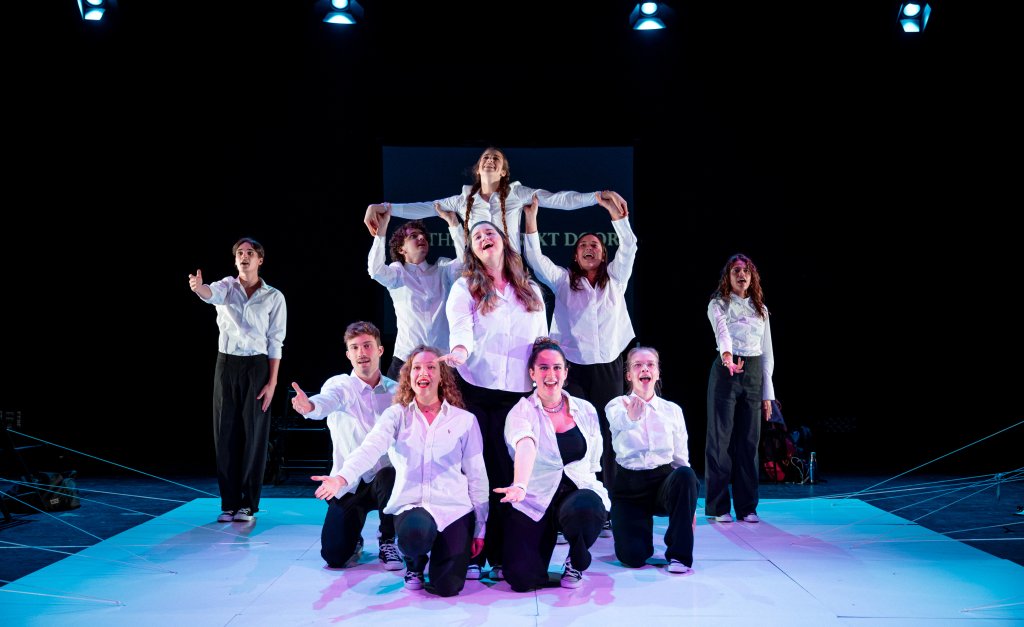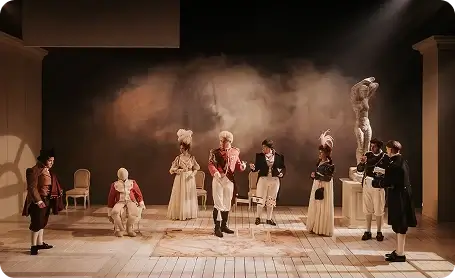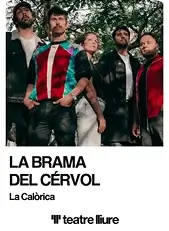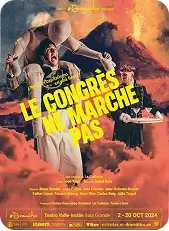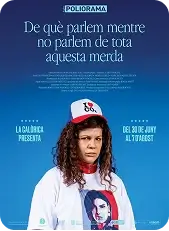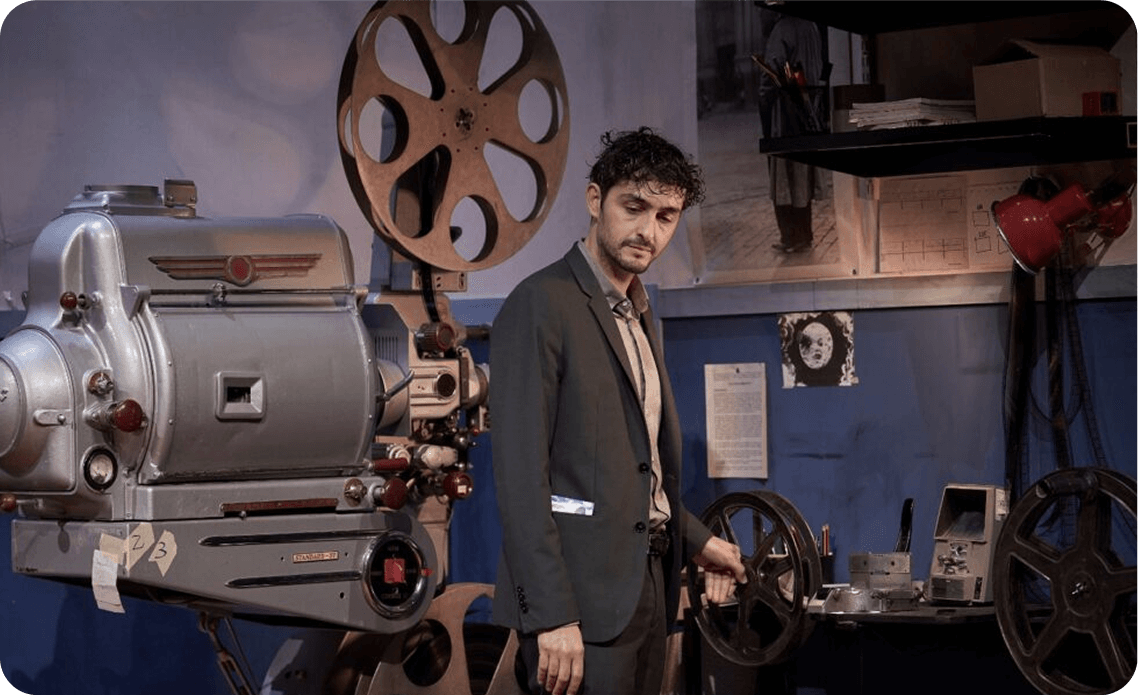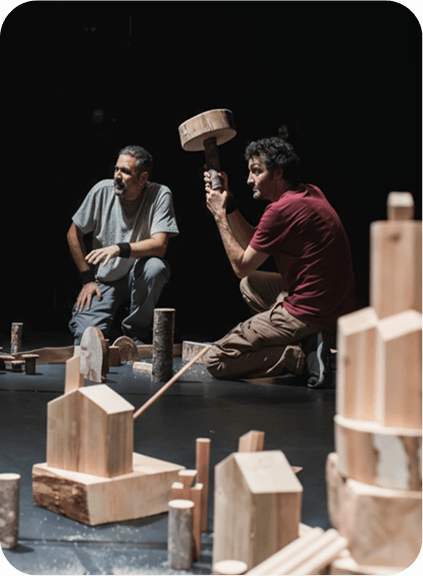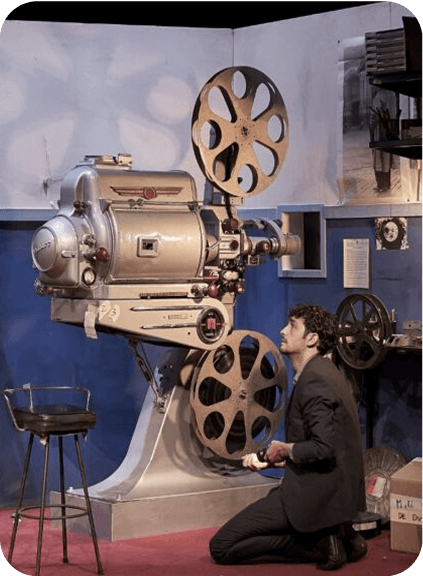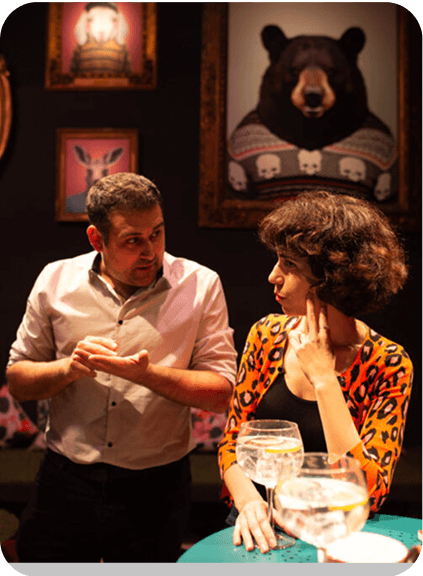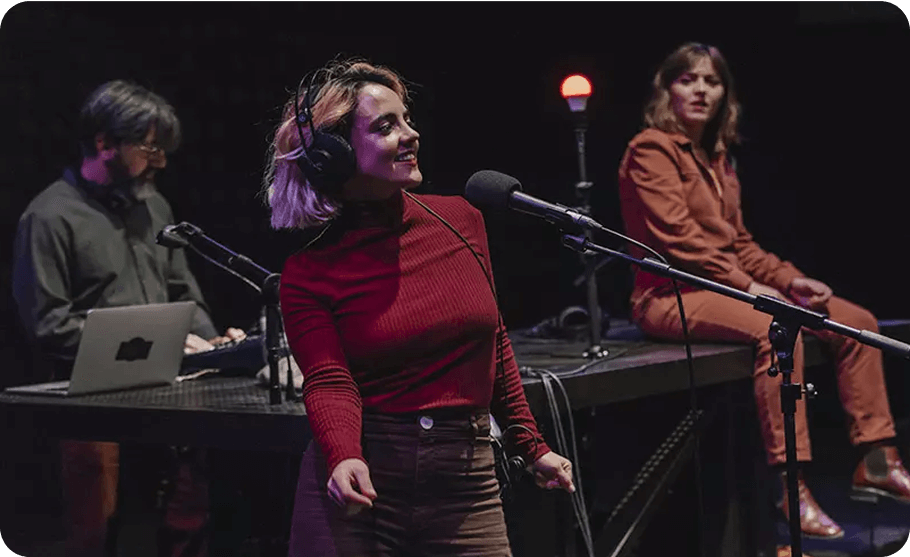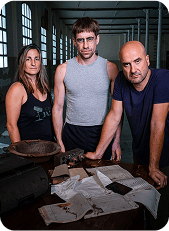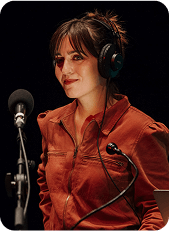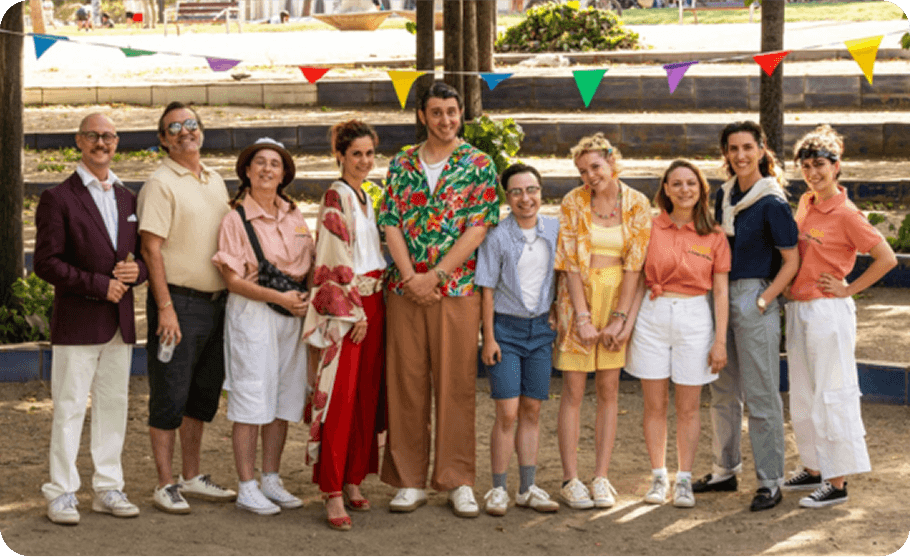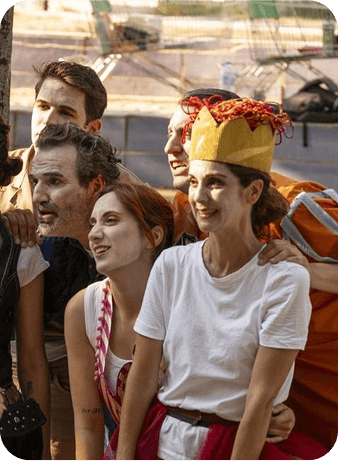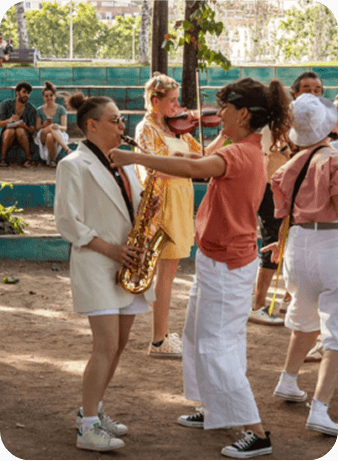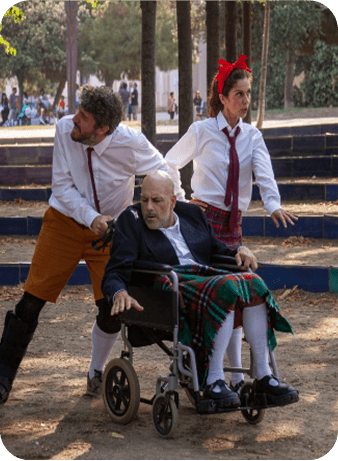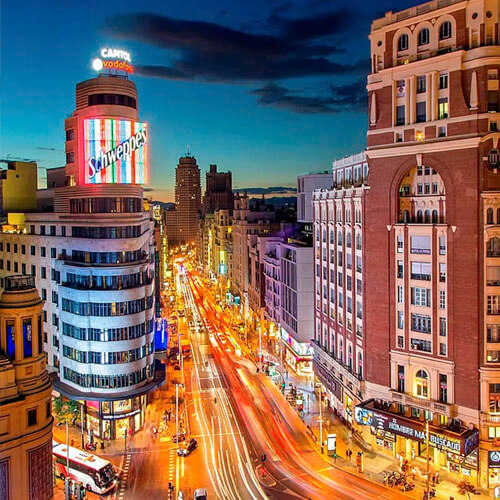Theatre companies producing good work in Barcelona
Barcelona has a really diverse, vibrant, politically engaged, and artistically rich stage culture that has developed in unique and very particular ways that have to do with language, identity and a way of living that’s both widely inclusive and slightly scared of change.
This article aims to give you a practical overview of some of the companies that are producing exciting work right now, and some playwrights that are shaping the Catalan stage today.
In order to surf Barcelona’s theatre scene, one of the best ways is to follow the companies making waves today. Here are some key companies you should know:
1. La Calòrica
Founded in 2005
La Calòrica is a trailblazing collective known for their sharp, politically engaged and hilarious original work that blends dark humor with social critique. Their style is bold and highly collaborative, and they are not afraid to experiment while maintaining their style. They have also started to create audiovisual work as of late, as people want to see more and more of them. Their first tv show (Sala Polivalent) was produced by 3Cat (local Catalan Television Network) on 2025.
Type of plays:
They produce almost exclusively original pieces created collectively within the company, but they have grown quite a bit lately, so they have started to collaborate with other actors and professionals that help them build each show they create.
Language:
Catalan (mostly, but they have experimented with other languages too).
Where to find auditions:
Follow their Instagram and official website for open calls and workshop announcements, which occasionally lead to casting opportunities:
www.lacalorica.com
Recent plays by La Calòrica
2. La Ruta 40
Founded in 2011
La Ruta 40 is a Barcelona-based theatre company dedicated to transforming the stage into a space for discovery and reflection. With a stable core team and a commitment to intergenerational and interdisciplinary collaboration, they create original contemporary theatre that explores innovative forms and deep connections with audiences. They are not scared of different scenic languages and are keen on trying different disciplines. La Ruta 40 stands out for building bridges between generations and artistic disciplines while maintaining a strong focus on creativity and audience engagement.
Language:
Catalan (mostly)
Where to find auditions:
Follow their website and social media for occasional casting calls and workshop announcements: www.laruta40.net
Recent plays by La Ruta 40
3. MOS MAIORUM
Founded in 2008
Mos Maiorum is a Barcelona-based collective that specializes in documentary and political theatre. Their work transforms the stage into a kind of modern-day agora, where audience is usually placed at the center of urgent social and politically relevant conversations. Using immersive formats and real-life testimonies, they aim to provoke collective reflection and create space for transformative catharsis. Their productions often explore themes such as migration, systemic injustice, and erosion of democratic values.
Language:
Catalan and Spanish
Where to find auditions:
Keep an eye on their website and local casting boards. They also post occasional calls on their social media platforms:
es.mosmaiorum.info
Recent plays by Mos Maiorum
3. Parking Shakespeare
Founded in 2012
Parking Shakespeare is a unique company dedicated to performing Shakespeare’s works in a certain park in Barcelona (Espiral dels Til·lers, parc de l’Estació del Nord) every summer. They have forged a reputation by trusting local talent to showcase the Bard’s plays through the lens of different local directors. They offer annual open calls and are known for engaging local communities through accessible, outdoor theatre. Their productions are original adaptations of classic texts.
Language:
Catalan (with occasional bilingual performances)
Where to find auditions:
Annual open call usually announced in spring on their website and social media channels:
www.parkingshakespeare.com
Recent plays by Parking Shakespeare
Catalan playwrights you should follow
Understanding a kind of theatre means getting to know the people writing its stories. Catalunya has a rich tradition of playwriting that goes beyond classic texts and dives straight into today’s pressing concerns: identity, memory, power, class, history, and the alarming upraising of individualism and neoliberalism over collectiveness. Whether you’re looking to audition, collaborate, or discover material to work on, these are some names you’ll want to know.
VICTORIA SZPUNBERG

Szpunberg is known for writing and directing her own productions, often blending genres like dystopia, sci-fi and dark comedy. Her work critically (and sometimes cryptically) engages in contemporary social and political issues. She writes from an open, transdisciplinary perspective, often exploring “existential confusion” and feelings of dislocation in today’s world. Her most recent plays such as El pes d’un cos or L’imperatiu categoric tackle topics like housing access, immigration, identity and aging, using irony and surreal elements to expose social contrasts. She has noted that humor and the body are tools to address difficult realities.
Szpunberg’s Awards
Szpunberg has won multiple top Catalan/Spanish theatre awards and honors. Some of the most recent include Barcelona’s Ciutat de Barcelona de Teatre prize (Performing Arts category) for her play L’imperatiu categòric in 2024, and that same year, Time Out Barcelona Culture Awards named her “Best Creator”. Her works have also garnered Catalan critics’ awards, such as nominations for the Butaca theatre prizes.
SÍLVIA NAVARRO
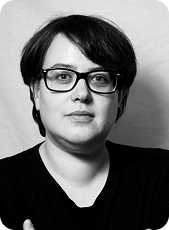
Navarro builds complex and ironic plays usually populated by strong female characters. She often “takes a scientific or social approach to drama” (as she is also a sociologist). For example, 94 Minuts (2017) uses psychological studies to satirize the “perfect” romantic relationship, while Un turista se suïcida (2018) uses a darkly comic premise to critique mass tourism and gentrification.
Navarro’s Trajectory
Navarro co-founded her own company, La Canina, in 2019, and has created several shows with them that vary in tone, themes and style, while maintaining a rigorous and iconic identity. They describe their way of working as “surviving small catastrophes”, blending humor with pointed commentary on issues like materity (one of her last plays BioLògica), our attachment to objects (Mitja Taronja), generational gaps, or social invisibility. Navarro’s writing is fresh, sharp, witty, and she isn’t afraid to try new things or styles while keeping a very strong identity as a writer.
Navarro’s Awards
She has also earned significant Catalan playwriting awards. For example, she won Premi Ciutat d’Alcoi (Alcoi City Playwriting Prize) in 2018 for Un turista se suïcida and Premi Frederic Roda de Teatre in 2020 for her play Negatius that also won the Valencian Critics Award (Premi de la Crítica Valenciana) in 2021.
JORDI CASANOVAS
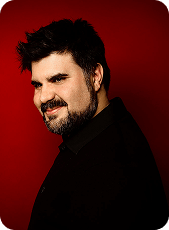
Jordi Casanovas is one of Catalunya’s most prolific contemporary playwrights and directors. He studied engineering and fine arts before turning to theatre; he co-created the Flyhard theatre company, that later founded Sala Flyhard, that has become nowadays one of Barcelona’s principal platforms for Contemporary Catalan Playwriting. Casanovas is noted for creating documentary theatre that explores socially and politically charged subjects.
Casanovas Notable works
His notable works include Jauría (2019) and Immunitat (2022, about pandemic politics), as well as dark comedies like Idiota (2015) and political dramas like Patria (2012). As noted by the Catalan arts council, he “contributes to self-understanding and reflection on the great issues of contemporary society” through his work.
Casanovas Awards
Casanovas has received virtually every top Catalan theatre prize. In 2022 he was awarded the Premi Nacional de Cultura (Catalunya’s National Culture Award) for his body of work. He has won Spain’s Max Awards (the country’s national theatre awards) – notably taking Best Theatrical Show and Best Adaptation in 2020 for Jauría. In Barcelona he won the Premi Ciutat de Barcelona de Teatre award in 2012 (Patria) and multiple Butaca critics’ awards (e.g. Best Play in 2009, 2011 and 2015).
CLÀUDIA CEDÓ

Cedó is a community arts advocate: in 2006 she founded Escenaris Especials, a theatre program for people at social risk. She has worked as a prison psychologist, in art therapy, and has also trained in documentary theatre (e.g. with Berlin’s Dokumentartheater). In Barcelona she is known for writing intimate, often humorous plays and for directing socially engaged performances. Cedó’s plays emerge from personal experience and very contemporary concerns that are often overlooked. Her debut Tortugues: La desacceleració de les partícules (2015) is a comic fable about the pace of modern life and love, following characters who retreat to the countryside in order to consciously deaccelerate in an increasingly accelerated world. Thematically, Cedó often blends quirky humor with psychological insight.
Cedó’s Awards
Cedó quickly gained recognition. Her Tortugues won the Premi Butaca 2015 for Best Text (Catalunya’s audience-choice critics award) and was nominated for other critics’ prizes. Her projects like Escenaris Especials have also been honored regionally, reflecting her impact on inclusive theatre.
Conclusion
Barcelona’s theatre scene is a dynamic, constantly evolving, and very much alive blend of tradition and experimentation, rooted in a strong local cultural and political identity while constantly engaging with global artistic practices. As a stage actor in Barcelona, you’ll be entering a creative ecosystem that thrives in talent, collaboration, initiative, and artistic risk-taking. From devising new work in self-produced collectives to auditioning for established companies, from navigating union structures to discovering playwrights, directors and creators whose voices shape the contemporary Catalan stage, there are many ways and paths to engage with this ever-changing and diverse scene.
Don’t get me wrong. It certainly can feel daunting at first. Even frustrating. Especially if you’re not fluent in Catalan (or Spanish). But please don’t let that hold you back. Language can be learned, but curiosity, perseverance, and an open mind are even more essential tools for finding your space as an actor here. Whether you’re joining a cast, starting your own company, or developing new work, there’s room for voices that are authentic, daring, and committed.
So come see some of the work that’s being shown around. Get to know how Catalan theatre is made, who’s making it, and how you can participate in it. The stage in Barcelona is yours to step into.



